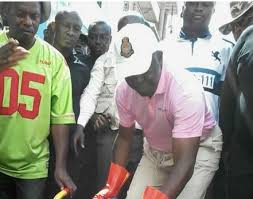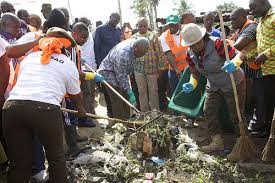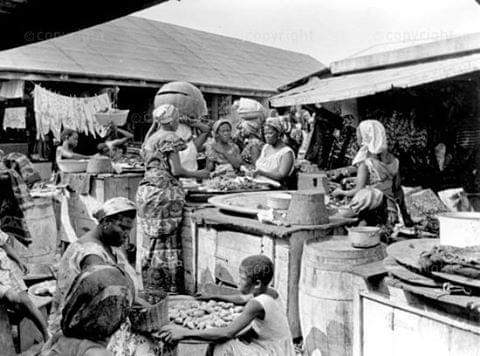IMANI to President Mahama: Great call on sanitation
 IMANI to President Mahama: Great call on sanitation; the sector needs
IMANI to President Mahama: Great call on sanitation; the sector needs
dedicated funding and private sector support Ghanaians throughout the country came out in their numbers to participate
in the maiden edition of the National Sanitation Day that was marked last
Saturday. The President, Mr. John Dramani Mahama; the Vice-President, Mr.
Kwesi Bekoe Amissah-Arthur, political leaders, as well as traditional
leaders, including the Asantehene, Otumfuo Osei Tutu ll, Local Government
Minister Mr. Julius Debrah and other prominent individuals, joined
residents of cities, towns and villages to embark on the exercise.
Sanitation plays a key role in the development of a nation. It extends
beyond the cleanliness to warding off environmental related disease such
as malaria, cholera, dysentery and the like and can promote good health
and sound mind for economic development.




The recent Cholera outbreak which recorded about 22,000 cases and
resulted in about 174 deaths was the worse since 1982 according to the
Ghana Health Service. That unfortunate situation painted a dire picture
of sanitation in Ghana and reinforced the position of the unattainable
Millennium Development Goal (MDG) target of halving the proportion of
people without basic sanitation by 2015. Approximately 19,000 Ghanaians
including 5,100 children under the age five die each year from diarrhea;
90% of the cases are directly related to poor water, sanitation and
hygiene. Furthermore, 4.8 million people have no latrines therefore
defecate in the open with attendant diseases that cost us $79 million
annually .
In the light of the above, we cannot over emphasise the importance of the
National Sanitation Day which will be marked on the first Saturday of
every month with nationwide cleanup exercises. However the National
Sanitation Day initiative would not yield the needed results if the
citizenry do not take absolute responsibility for ensuring a clean
environment. In the eyes of the public, sanitation management and control
is the sole responsibility of the central government.
This notion was dispelled by President Mahama when he said on Sanitation Day “Sanitation is a public good and its impact affects everybody irrespective of one’s
ethnic, political, religious or geographical background. What this means
is that it is our collective responsibility as Ghanaians to take the
needed measures to ensure that we live in a clean, safe and healthy
environment”.
Sadly, after the much patronised sanitation exercise, there remains on the
side of streets significant filth from choked drains and household
garbage. The reason is not farfetched. There are less waste bins for the
collection of the waste. To sustain this nationwide cleanup effort
instituted by the Government, there is the need for a nationwide supply of
waste collection bins, to ensure that waste is properly managed after such
exercises.
It is important to mention that waste management is no simple business.
The waste management value chain is such that the treatment plants and
landfill sites are crucial, because without these there is no point
collecting the waste in the first place. The technology and equipment to
manage waste in a clean and efficient manner are highly capital intensive
as they must run 24 hours every day. Yet government has no plans for
dedicated investment into these important amenities. There are but a few
significant private sector players who are making efforts to tame the
waste menace on a shoe string budget as they receive virtually no support
from the Government.
The sanitation sector in Ghana is indeed plagued with a lot of challenges,
inadequate financing being the biggest of them. Sadly, the sector is
highly dependent on donor support and the internal support is
substantially very low which sends the signal that the country rests on
its heels in carrying out an effective management of the sanitation
problems.
Let us see how. For the implementation of various water and sanitation
projects, the 2014 budget announced that “an amount of GH¢531,389,023 has
been allocated.” The budget also gave the breakdown as GH¢89,718,844
coming from Government of Ghana (GOG), GH¢6,023,120 as Internally
Generated Funds (IGF) from sector agencies, and a whopping GH¢435,647,058
as the contribution of Donor Partners (DPs).
The Ministry of Local Government and Rural Development (MLGRD) which is charged with the responsibility of policy planning, design and formulation on sanitation for the implementation by the various Metropolitan, Municipal and District Assemblies (MMDAs) in the country. All the activities of the assemblies are tied to the District Assembly Common Fund (DACF) which is characterized by delay in release of funds and the insufficient nature of the sanitation budget contribute significantly to the problem of the sanitation sector.
Additionally, the poor co-ordination between the sanitation outfit in the assembly and waste management companies, and the weak governance system in the assemblies also contribute to the reasons for our poor management in sanitation.
In 2012, a World Bank report estimated that Ghana loses $290 million
annually due to poor sanitation. Our bad sanitation definitely impacts
other sectors of our economy such as the tourism industry. Our service
sector which includes tourism constituted 49.5% of our GDP in 2013 . For a
country that generates part of its revenues from tourism, cleanliness
should be among our priorities to enable us sustain the revenues
generated.
The way forward in facing the poor sanitation should include the following
§ Allocation of Higher Investments to sanitation. Current sanitation
investment in Ghana is the less than 0.1% GDP which is lower than several
estimates for what is required. Increased investments in sanitation are
required not only to realize the health and welfare benefits of sanitation
but also avert the large economic losses. Considering the significant role
sanitation plays in the lives of people as well as its possible health
implications it is crucial that GOG creates a special sanitation fund
(more like the GETfund) for long term investment in the sector.
• Institution of an effective governance system that indicate clear roles,
responsibilities and targets to be achieved.
• The assemblies must be proactive in identifying economic opportunities
in their jurisdiction to raise funds for their activities especially
sanitation, other than the relying heavily on central government and donor
support.
• Increase in private sector investment in waste management and sanitation
in addition to government efforts to encourage private sector
participation.
• The cleanliness of our country should be a priority of all. Our by-laws
on sanitation appear lax; it is about time we enforced them by instituting
reward systems and punishment for both sanitation staff and communities to
ensure citizens contribute in keeping our nation clean.
• The National Sanitation Day should not be a one-day-show; it must be
sustained until poor sanitation becomes a thing of the past. Just as our
local textile industry has received a boost through the National Friday
Wear campaign as launched by the Ministry of Trade, Industry and
Presidential Special Initiative in 2004, so should we sustain this
initiative in a more creative and engaging way.
IMANI, your local think tank, is ten years this year. Anniversary
Celebrations start from November 12 and climaxes on November 27th with a
public sector performance awards, a speech on integrity in public office
and a dinner. Stay tuned. Please donate towards our anniversary by sending
an enquiry email to info@imanighana.org. Email masante@imanighana.org on
ho you could participate in the numerous programmes lined up for you.
This post has already been read 844 times!







Post Comment